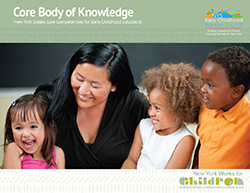
Core Body of Knowledge
New York State's Core Competencies for Early Childhood Educators

1.2
Resources for Competency 1.2:
6
click to view resource list
Social and Emotional Development
The professional working with young children encourages children's social and emotional development.
Resources & Media for Understanding Competency 1.2
Behaviors & Skills
-
aConsiders temperament and individual differences when interacting with children and planning experiences
-
bCreates a climate and daily schedule that encourages trust and social interaction with other children and adults
-
cHelps children cope with separation and transitions
-
dUses tone, words and gestures to let children know they are respected
-
eProvides opportunities for children to help, to make choices, and to do things for themselves
-
fRecognizes children's effort rather than their accomplishments, intelligence or fixed characteristics
-
gAcknowledges when children exert self-discipline and self-control
-
hFinds ways to help children feel successful, identify and pursue passions, and develop a sense of personal identity
-
iUses empathy to help children recognize and acknowledge their emotions
-
jHelps children value their ethnic and cultural traditions
-
kEncourages children to be responsible, compassionate, inclusive, and appreciate each other's strengths
-
lHelps children build on their strengths and work on their challenges
-
mModels cooperative work, critical thinking, effective problem-solving, and helps children resolve conflict
-
nEncourages cooperative work and play






